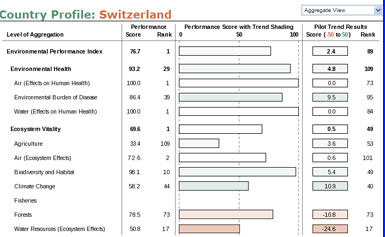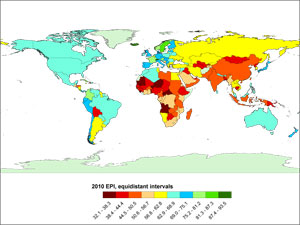
|
The majority of countries worldwide will fall short of the net-zero goal to reduce greenhouse gas (GHG) emissions by 2050, according to the 2022 Environmental Performance Index (EPI) produced by researchers at the Yale Center for Environmental Law & Policy (YCELP) and CIESIN. The EPI uses emissions data from the past 10 years as a basis for projecting mid-century levels for 180 countries. For the first time India’s EPI score was the lowest among all countries, reflecting its drastically poor air quality and quickly rising GHG emissions. Intensifying air pollution and increasing GHG emissions also placed China towards the bottom of the 2022 scorecard, at 160. Among rich countries, the US was ranked low at 43; although it has reduced its emissions, its starting rate is so high that it is unlikely to make the 2050 target. Countries beset by conflict or other crises such as Myanmar and Haiti or nations that favored economic growth over environmental concerns—for example, Vietnam, Bangladesh, and Pakistan—also received low rankings.
Denmark was again rated the most sustainable nation, with the United Kingdom and Finland close behind owing to success in cutting GHG emissions. Sweden and Switzerland were among high-scoring countries for air and water quality. Offering insights into the drivers of good environmental performance, CIESIN senior research scientist Alex de Sherbinin, one of the lead authors of the 2022 EPI, explained, “Good governance, policy commitment, and targeted environmental investments separate the nations that are moving toward a sustainable future from those that are not. High-scoring countries have well-thought-through programs to protect public health, conserve natural resources, and mitigate greenhouse gas emissions.”
The 2022 EPI used 40 performance indicators to rank 180 countries on their proximity to international targets for addressing air and water pollution, waste management, and biodiversity and habitat protection, as well as the transition to a clean energy future. Even with continuing lags in GHG emissions reduction worldwide, over the past decade significant progress has been made on critical environmental health issues like sanitation, drinking water, and indoor air pollution. YCELP and CIESIN have collaborated in producing the EPI biennially since 2006.
Adapted from a press release by the Yale Center for Environmental Law & Policy.



